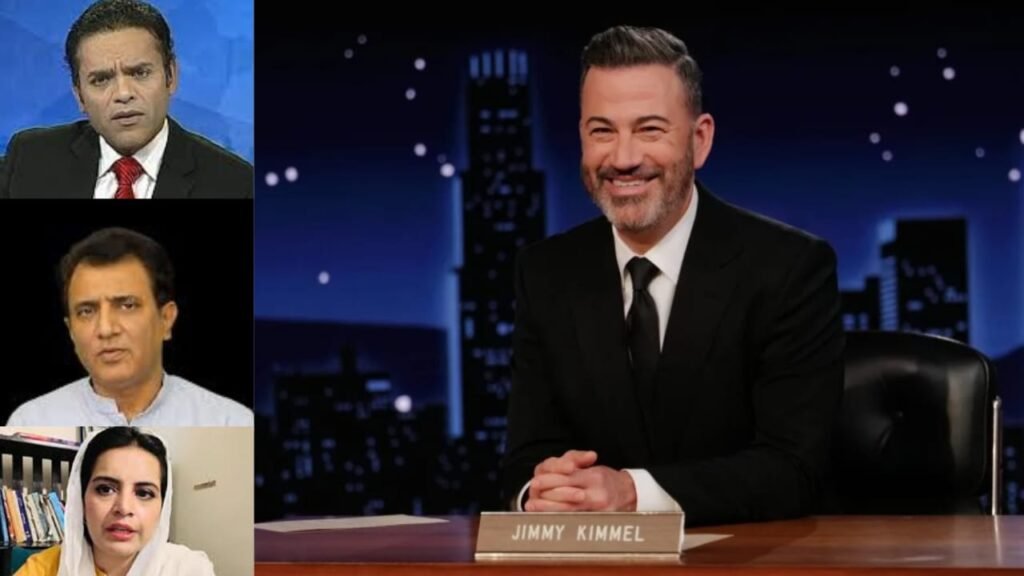Disney suspends Jimmy Kimmel, CBS cancels Stephen Colbert, while Pakistani anchors Kashif Abbasi, Habib Akram, and Samina Pasha face bans—signaling a global crackdown on anchors and shrinking press freedom.
By Imran Malik
When Disney suspended late-night host Jimmy Kimmel over his controversial comments about conservative activist Charlie Kirk’s assassination attempt, U.S. President Donald Trump was quick to cheer the move. Trump declared it a “good thing” and even suggested Kimmel should never be reinstated. But reports suggest Kimmel’s representatives are quietly negotiating with Disney to resume his show.
For decades, the United States projected itself as the global champion of free speech. Yet, recent events show that the climate for journalists and anchors in America is increasingly resembling countries like Pakistan, where media restrictions have long been the norm.
During Trump’s first presidency, CNN, CNBC, and The New York Times reporters faced hostility and bans from press conferences. Now, Trump is again warning that any anchor who refuses to follow the “government line” could see their channel’s license suspended. This is an alarming message in a democracy that prides itself on the First Amendment.
Colbert’s Exit: Another Warning Sign
The suspension of Kimmel is not an isolated case. CBS recently announced the cancellation of The Late Show with Stephen Colbert, even though Colbert’s show leads late-night ratings with over 2.4 million viewers. Officially, the decision is tied to financial pressures and the looming Paramount-Skydance merger. But the timing is striking—coming just days after Colbert slammed Paramount’s $16 million legal settlement with Trump, calling it “a big fat bribe.”
Trump celebrated Colbert’s downfall, mocking his “talent” and suggesting other anchors like Kimmel and Fallon could be next. Despite the commercial success of The Late Show, Colbert’s sharp criticism of Trump has seemingly cost him his platform—revealing that politics, not ratings, may be driving these decisions.
The Pakistani Parallel
Sadly, these developments are not far removed from the state of media in Pakistan. In recent months, well-known anchors including Kashif Abbasi, Habib Akram, and Samina Pasha have been asked to leave their respective news channels. Abbasi’s wife, anchor Mehr Bukhari, even had her bank accounts frozen. Such measures show how governments use financial and legal levers to silence critical voices.
Pakistani journalists have long faced bans, suspensions, and pressures from governments. What’s new and concerning is how these tactics now echo in the U.S., once considered a haven for dissenting media voices.
A Global Pattern
Whether in Washington or Islamabad, the message is clear: anchors and journalists who challenge power risk losing their platforms, their livelihoods, and sometimes even their personal freedoms. What is unfolding today is not merely a battle over TV shows, but a larger erosion of democratic values.
The silencing of voices—be it Jimmy Kimmel, Stephen Colbert, Kashif Abbasi, Habib Akram, or Samina Pasha—should serve as a warning. If societies allow governments to dictate which journalists can speak, the very essence of the free press is under threat everywhere.
This is no longer just about Kimmel, or about Kashif Abbasi, Habib Akram or Samina Pasha. It is about the global trajectory of press freedom in an era of rising authoritarianism. Whether in a developing democracy or the world’s oldest one, the message is increasingly the same: Journalism that questions power is dangerous journalism.
And that, perhaps, is the greatest tragedy of our times.



6 Comments
This cleared up a lot of uncertainty — I feel more confident now.
As a Newbie, I am constantly searching online for articles that can aid me. Thank you
Excellent explanation — the visuals were worth a thousand words.
The article powerfully exposes a disturbing trend where political pressure silences critical voices in media, both in the U.S. and Pakistan. It’s alarming to see democratic principles erode as governments dictate acceptable discourse.baseballbros
This article powerfully exposes a disturbing trend where political pressure silences critical voices in media, both in the U.S. and Pakistan. It’s alarming to see democratic principles erode as governments dictate acceptable discourse.crazy cattle 3d github io
This article powerfully exposes a disturbing trend where political pressure silences critical voices in media, both in the U.S. and Pakistan. It’s alarming to see democratic principles erode as governments dictate acceptable discourse.grow a garden calculator